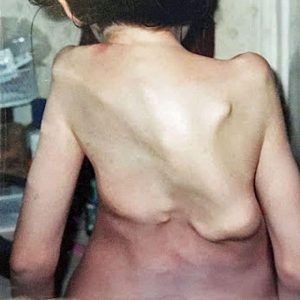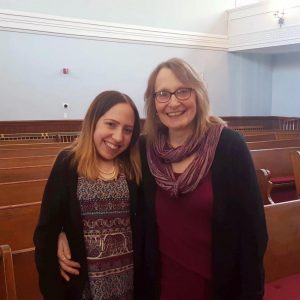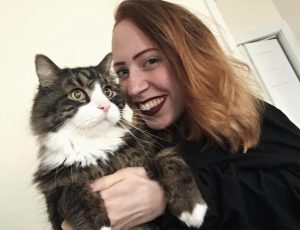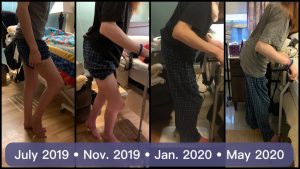Oshkosh native grows second skeleton, fights for FOP cure
November 11, 2020
Imagine growing a second skeleton inside your own body. Imagine painful flare-ups when new bone is forming within you. Imagine having this happen since you were 5 years old.
That’s exactly what Oshkosh native Jasmin Floyd has been going through. She was diagnosed with Fibrodysplasia Ossificans Progressiva, or FOP, over 20 years ago, in January 1999.
She and her family moved from Oshkosh to Connecticut in July 1998 due to her father accepting a new job. They didn’t know anybody in Connecticut or even the rest of New England.

Jasmin, now 27, was beginning kindergarten that same year. One fall morning, she complained of a stiff neck on the way to school. But she and her parents shrugged it off, thinking it was just stiff from having slept wrong the night before.
However, Jasmin’s neck was abnormally tilted when she left school the same day. So her parents started looking for the reason why, which led to consultations with four different doctors before a final diagnosis.
“One thought it was torticollis, they thought it was Lyme disease, they thought it was ankylosing spondylitis,” Jasmin’s mother, RoJeanne Doege, said. “I just know that it was very unsettling that we went to the doctors and they just didn’t know. It left us feeling kind of lost.”
Jasmin’s parents were left asking questions like “What’s wrong with our daughter?”, “Why is she having a stiff neck?” and “Why does she have these bumps on her back?”
A rheumatologist in Hartford, Connecticut finally diagnosed her with FOP, or “stone man syndrome.”
According to the International FOP Association, or IFOPA, FOP is “one of the rarest, most disabling genetic conditions known to medicine. It causes bone to form in muscles, tendons, ligaments and other connective tissues. Bridges of extra bone develop across joints, progressively restricting movement and forming a second skeleton that imprisons the body in bone.”
Jasmin is one of less than 300 people in the United States with FOP, and one of about 800 in the world. It is said to affect 1 in 2 million individuals worldwide.
“It was very emotionally gripping for her dad and I,” Doege said. “There was a lot of fear, a lot of scared thoughts about the future and what was happening. It was a very dark time for our family.”
But they tried to keep Jasmin’s life as normal as possible.
“We did whatever we could, but there was always in the back of our mind what the future may hold for her. There was grieving for what her future may not hold. But that’s been changed because she’s really come into her own – she has this disease, but it hasn’t defined who she is.”
In fourth or fifth grade, according to Jasmin, her teachers wouldn’t allow her to participate in some activities in class or during recess.
“As I got older, I was more isolated and I think that’s when I realized the difference and started to understand that I had to be cautious,” Jasmin said. “Every year, my mom and I would talk to my classmates. Even at age 8, I was able to say what it was doing [to my body].”
Though there is no official treatment, Jasmin takes the steroid pill prednisone to help with flare-up pains.

Jasmin described flare-ups as “a certain type of sharp pain,” and throbbing. Her most recent flare-up was in her arm, and she could tell that it felt different after the pain subsided.
Jasmin also explained that flare-ups are sporadic; they can come at any time and at any rate.
“It might be more active when you’re young and then it might take a break, or it could be very mild,” she said. “The most flare-ups I’ve had was last year and that was the most life-altering. Before then, there were a few flare-ups, but nothing major.”
That life-altering flare-up happened in February 2019, when Jasmin started experiencing pains in her right thigh.
“Throughout that first month, it was gradually getting more and more swollen,” she said. “It wasn’t until April that it started to affect my breathing, because the pain had moved into my lower back on the right side, because that muscle is all connected to your upper leg.”
She was brought to the hospital on April 13, 2019, for three weeks, trying different medicines to stabilize the pain.
“I had never had anything that major before, so that was all new for us,” Jasmin said.
After getting discharged from the hospital, Jasmin went to a skilled nursing facility for 17 months because the apartment they were living in wasn’t adaptable for her increased physical limitations.
Jasmin has been back at home in a new apartment since Oct. 14.
“I ultimately lost pretty much all of the mobility in my leg joints,” she said. “My hips, knees and ankles I can’t bend either; I can’t straighten them fully. Since I’ve been home, I now have caregivers that come in every day, which is quite a bit different than how my life was two years ago.”
Today, Jasmin is an unofficial spokesperson and ambassador for FOP through her blog and her writing. Sharing her story and raising awareness to help people with FOP gives others with it someone to look up to, someone to relate to.
She also actively participates with IFOPA, and has taken part in panel discussions and other events in previous years.
“They know that I’m very willing to do anything I can to raise awareness, and they are also very supportive of my writing; they’ve shared some of my things too,” Jasmin said.
Additionally, Jasmin is part of a close-knit community of people who have been diagnosed with FOP. Though they may not have all met before, they all know of each other.
“I know it can help other people, which really makes me feel even more empowered,” she said.
The largest part of her advocacy work for FOP is through her writing. She has a blog, One Spirit, Two Skeletons, and several other social media accounts — Facebook, two Instagram accounts, @twoskeletons and @p0sitivity, and Twitter — where she shares her story with people worldwide. This October, the IFOPA released a video telling Jasmin’s story. Jasmin also has a GoFundMe page to help pay for her medical needs.
“I think there’s always the hope that someone will stumble upon it, and that will help someone else get diagnosed, which I know that’s happened to several people,” Jasmin said.

“The only reason certain parents were able to find a diagnosis was because they saw maybe a video or an article or something, and then they approached their doctor with it and then got the diagnosis earlier then they would have.”
In 2006, scientists found the faulty gene that was causing FOP to happen. However, there is still no treatment or cure for it.
“I would want [a treatment] that is realistic for me,” Jasmin said. “I would want it to be something that I felt very confident about and that I could commit to. And, hopefully, even if I weren’t able to gain my mobility back, it would be incredible just to have that peace of mind I don’t have to fear anything getting worse.
“I used to be mad at my body, that it hates me,” she added. “Now, I’m able to turn it around and appreciate my body for the abilities I still do have. I have learned that it’s a waste of energy to really be mad at something like FOP that you just in no way can control. It’s better to try to surrender as much as possible.”
Jasmin hopes that one day, people will realize that just because she functions differently than able-bodied individuals, she is still human.
“I feel like a lot of people that aren’t affected by anything medically, they have a different perspective that’s not always as hopeful or positive. I just would hope that they’re able to read my writing and it would help them in some way that would affect them,” she said.
“I would hope for people that they’re able to look at someone with any type of physical difference and really get to know them, not have that assumption that people seem to create in their head that, ‘Oh, I don’t know what to say, so I’m not going to say anything.’ It just means so much when they don’t allow that to put a wall between us.”














